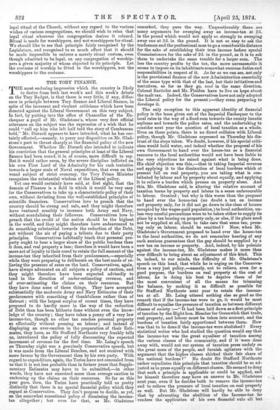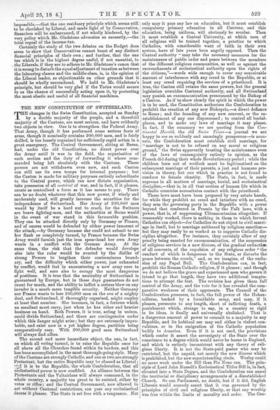THE TORY FINANCE.
THE moat enduring impression which the country is likely to derive from both last week's and this week's debate on the Tory Budget, is that there is very little, if any, differ- ence in principle between Tory finance and Liberal finance, in spite of the incessant and virulent criticisms which have been directed against the Liberal Government on this very subject. In fact, by putting into the office of Chancellor of the Ex- chequer a pupil of Mr. Gladstone's, whose very first official utterance on the subject was the expression of a wish that he could " call up him who left half told the story of Cambuscan bold," Mr. Disraeli appears to have intended, what he has cer- tainly effected,—namely, to parry any disposition on Mr. Glad- stone's part to thrust sharply at the financial policy of the new Government. Whether Mr. Disraeli also intended to indicate his conviction that the general principles at least of the Liberal finance had been sound, it is, of course, more difficult to say. But it would rather seem, by the severe discipline inflicted on his own First Lord of the Admiralty for his rash tentative towards a larger scale of Naval expenditure, that even on the vexed subject of strict economy, the Tory Prime Minister recognises the substantial wisdom of the Liberal policy.
Yet one would certainly have said, at first sight, that the domain of Finance is a field in which it would be very easy for the Conservatives to take up a characteristic policy of their own, without deviating from the well-established principles of scientific financiers. Conservatives love to preach that the country should be strong and safe, and they might therefore have ventured sensibly to increase both Army and Navy, without scandalising their followers. Conservatives love to preach that the credit of the nation should be the highest in the world, and they might therefore have endeavoured to do something substantial towards the reduction of the Debt, not without the air of paying a tribute due to their party principles. Conservatives habitually teach that personal pro- perty ought to bear a larger share of the public burdens than it does, and real property a less ; therefore it would have been a mere act of loyalty to their creed to retain the full amount of the income-tax they inherited from their predecessors,—especially while they were preparing to deliberate on the best mode of re- lieving the pressure of rates on the land. Conservatives, again, have always advocated on all subjects a policy of caution, and they might therefore have been expected advisedly to tend in the direction of under-estimating revenue, and of over-estimating the claims on their resources. But they have done none of these things. They have accepted substantially the moderate Army and Navy Estimates of their predecessors with something of thankfulness rather than of distrust ; with the largest surplus of recent times, they have proposed to do hardly more in the way of the reduction of Debt than has been hitherto done without even the know- ledge of the country ; they have taken a penny off a very low income-tax, though no other tax reaches personal property so effectually without pressing on labour ; and instead of displaying an over-caution in the preparation of their Esti- mates, they have, as Sir Stafford Northcote very frankly tells us, introduced the policy of fully discounting the expected increment of revenue for the first time. Mr. Laing's speech on Thursday night was a genuinely Conservative speech, but it was made from the Liberal Benches, and not received with more favour by the Government than by his own party. With regard to expenditure, again, the Tories have not concealed from us that it is not less probable than in former years that Supple- mentary Estimates may have to be submitted,—in other words, they have not exercised more than average caution in reckoning up the claims on their resources. So far as this year goes, then, the Tories have practically told us pretty distinctly that there is no special financial policy which they regard as Conservative. They don't propose to decide, as yet, on the somewhat sensational policy of dismissing the income- tax altogether ; but even for that, as Mr. Gladstone remarked, they pave the way. Unquestionably there are many arguments for sweeping away an income-tax at 2d. in the pound which would not apply so strongly to sweeping away one at 3d. in the pound. It is not so easy to ask the tradesman and the professional man to go a considerable distance for the sake of establishing their true income before special Commissioners for the sake of 2d. in the pound, as it is to ask them to undertake the same trouble for a larger sum. The less the country profits by the tax, the more unreasonable it seems to impose on its inhabitants somewhat onerous duties and responsibilities in respect of it. As far as we can see, not only is the provisional finance of the new Administration essentially of the same type with that of the last, but their initiatives and tentatives, so far as they go, tend in the same direction. Colonel Barttelot and Mr. Fielden have to live on hope about the malt tax. Indeed, the Conservatives have not only adopted the Liberal policy for the present ;—they seem preparing to develope it.
The only exception to this apparent identity of financial policy is the boon given out of the Imperial Exchequer to the local rates in the way of a fixed sum towards the county lunatic asylums and towards the police rates, and the undertaking to consider next year the question of local taxation as a whole. Even on these points, there is no direct collision with Liberal policy, though Mr. Gladstone expressed on Thursday his dis- trust of the steps taken. We doubt, however, if his special criti- cism would hold water, and indeed whether the proposal of his own Government to hand over the house-tax as a financial resource to the local authorities would not have been liable to the very objections he raised against what is being done. His chief objection was this,—that in taking Imperial revenue and applying it to the diminution of local burdens which at present fall on real property, you are taking what is con- tributed by labour and by property about equally, and applying it to relieve a burden which presses on property alone. And this, Mr. Gladstone said, is altering the relative amount of taxation borne by property and labour in a sense unfavourable to labour. Granted ; but why is this worse than the proposal to hand over the house-tax (no doubt a tax on income and property only, for it did not go down to the class of houses occupied by the wages-paid population,) to local authorities, un- less very careful precautions were to be taken either to supply its place by a tax bearing on property only, or else, if its place need not be supplied at all, then to take care that some tax, press- ing only on labour, should be remitted ? Now, when Mr. Gladstone's Government proposed to hand over the house-tax to the local authorities, we do not remember hearing of any such anxious guarantees that the gap should be supplied by a new tax on income or property. And, indeed, by his polemic against the income-tax, Mr. Gladstone makes it more than ever difficult to bring about an adjustment of this kind. This is, indeed, to our minds, the difficulty of Mr. Gladstone's speech on this head, that while he is urging on the Conserva- tives a very just policy,—namely, not to relieve, even for a good purpose, the burdens on real property at the cost of labour, he is doing his best to deprive them of far the most convenient of all the means for trimming the balance, by making it as difficult as possible for Sir Stafford Northcote next year to retain the income- tax at all. Mr. Laing uttered nothing else so good as the remark that if the income-tax were to go, it would be most difficult to equalise the pressure of taxation as between different classes of society :—" It had been laid down as a first principle of taxation by the Right hon. Member for Greenwich that trade, real property, and labour must be taken into account, and the burdens of taxation fairly apportioned between them. How was that to be done if the income-tax were abolished ? Every statistical writer who had studied the question would say that the income-tax was the great equaliser of taxation among the various classes of the community, and if it were done away with, would not our system of taxation press unduly on the great mass of the people, and furnish agitators with the argument that the higher classes shirked their fair share of the national burdens ?" No doubt Sir Stafford Northcote rather repudiates this principle that taxation should be so ad- justed as to press equally on different classes. He seemed to deny that such a principle is applicable or could be applied, and he himself therefore may have an answer to Mr. Gladstone next year, even if he decides both to remove the income-tax and to relieve the pressure of local taxation on real property as well. But Mr. Gladstone will hardly be able to deny that by advocating the abolition of the Income-tax he renders the application of his own financial rule all but impossible,—that the one residuary principle which seems still! to be cherished by Liberal, and made light of by Conservative, financiers will be embarrassed, if not wholly hindered, by the very policy which Mr. Gladstone advocates so earnestly,—the total repeal of the income-tax. Certainly the study of the two debates on the Budget does seem to show that Conservatives cannot boast of any distinct financial principles of their own ; and further, that the one tax which is in the highest degree useful, if not essential, to _the Liberals, if they are to adhere to Mr. Gladstone's canon that it is wrong to disturb the equal adjustment of taxation as between the labouring classes and the middle-class, is, in the opinion of the Liberal leader, so objectionable on other grounds that it should be wholly surrendered. We hold to Mr. Gladstone's principle, but should be very glad if the Tories would secure to us the chance of successfully acting upon it, by protecting the most elastic and useful of all financial machines.



































 Previous page
Previous page